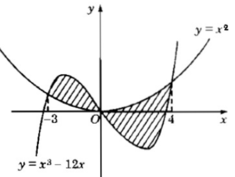
Hãy nhập câu hỏi của bạn vào đây, nếu là tài khoản VIP, bạn sẽ được ưu tiên trả lời.


a) Đáp số: 1/6
b) Đáp số: 937/12.
Hướng dẫn:


c) Đáp số: 2
Hướng dẫn: 
d) π/2 - 1
Hướng dẫn:

Đặt x = tan t để tính 
e) Đáp số: 27/4
Hướng dẫn: Phương trình tiếp tuyến tại (-1; -2) là y = 3x + 1. Do đó, diện tích :


Đặt \(\dfrac{x}{y}+\dfrac{y}{x}=t\Rightarrow\left|t\right|\ge2\)
\(\dfrac{x^2}{y^2}+\dfrac{y^2}{x^2}=t^2-2\)
\(\dfrac{x^4}{y^4}+\dfrac{y^4}{x^4}=\left(\dfrac{x^2}{y^2}+\dfrac{y^2}{x^2}\right)^2-2=\left(t^2-2\right)^2-2=t^4-4t^2+2\)
\(\Rightarrow P=f\left(t\right)=t^4-4t^2+2-\left(t^2-2\right)+t\)
\(f\left(t\right)=t^4-5t^2+t+4\)
Xét hàm \(f\left(t\right)=t^4-5t^2+t+4\) trên \((-\infty;-2]\cup[2;+\infty)\)
\(f'\left(t\right)=g\left(t\right)=4t^3-10t+1\)
\(g\left(t\right)\) bậc 3 nên có tối đa 3 nghiệm
\(g\left(-2\right)=-11\) ; \(g\left(0\right)=1\)
\(\Rightarrow g\left(-2\right).g\left(0\right)< 0\Rightarrow g\left(t\right)=0\) có nghiệm \(t_1\in\left(-2;0\right)\)
\(g\left(1\right)=-5< 0\Rightarrow g\left(0\right).g\left(1\right)< 0\Rightarrow g\left(t\right)\) có nghiệm \(t_2\in\left(0;1\right)\)
\(g\left(2\right)=13\Rightarrow g\left(1\right).g\left(2\right)< 0\Rightarrow g\left(t\right)\) có nghiệm \(t_3\in\left(1;2\right)\)
Dấu \(f'\left(t\right)\):

Từ đây ta thấy \(f\left(t\right)\) nghịch biến trên \((-\infty;-2]\) và đồng biến trên \([2;+\infty)\)
Hay GTNN của \(f\left(t\right)\) sẽ rơi vào \(t=-2\) hoặc \(t=2\)
\(f\left(-2\right)=-2\) ; \(f\left(2\right)=2\)
\(\Rightarrow f\left(t\right)_{min}=-2\) khi \(t=-2\) hay \(P_{min}=-2\) khi \(x=-y\)


`a)TXĐ: R`
`b)TXĐ: R\\{0}`
`c)TXĐ: R\\{1}`
`d)TXĐ: (-oo;-1)uu(1;+oo)`
`e)TXĐ: (-oo;-1/2)uu(1/2;+oo)`
`f)TXĐ: (-oo;-\sqrt{2})uu(\sqrt{2};+oo)`
`h)TXĐ: (-oo;0) uu(2;+oo)`
`k)TXĐ: R\\{1/2}`
`l)ĐK: {(x^2-1 > 0),(x-2 > 0),(x-1 ne 0):}`
`<=>{([(x > 1),(x < -1):}),(x > 2),(x ne 1):}`
`<=>x > 2`
`=>TXĐ: (2;+oo)`
câu l) $x^2-1 > 0$ thì giải ra 2 nghiệm $x < -1, x > 1$ mới đúng chứ nhỉ?

Em chỉ thử thôi, giáo viên nào đi qua check hộ em với ạ!
\(y'=3-\dfrac{4}{x^3}\)
\(y'=0\Leftrightarrow x=\sqrt[3]{\dfrac{4}{3}}\notin[2;+\infty)\)
\(\Rightarrow y_{min}=f\left(2\right)=3.6+\dfrac{2}{2^2}=\dfrac{13}{2}\)
b/ \(y'=2-\dfrac{2}{x^3}\)
\(y'=0\Leftrightarrow x=1\notin(0;\dfrac{2}{3}]\)
\(f\left(0,4\right)=7,05;f\left(0,5\right)=5\Rightarrow ham-nghich-bien-trong-nua-khoang-(0;\dfrac{2}{3}]\)
\(\Rightarrow y_{min}=f\left(\dfrac{2}{3}\right)=2.\dfrac{2}{3}+\dfrac{1}{\left(\dfrac{2}{3}\right)^2}=\dfrac{43}{12}\)
c/ \(y=x+\dfrac{1}{x-1}\Rightarrow y'=1-\dfrac{1}{\left(x-1\right)^2}\)
\(y'=0\Leftrightarrow1-\dfrac{1}{\left(x-1\right)^2}=0\Leftrightarrow\left[{}\begin{matrix}x=0\notin\left(1;+\infty\right)\\x=2\in\left(1;+\infty\right)\end{matrix}\right.\)
\(f\left(\dfrac{3}{2}\right)=\dfrac{3}{2}+\dfrac{1}{\dfrac{3}{2}-1}=\dfrac{7}{2};f\left(2\right)=3;f\left(3\right)=\dfrac{7}{2}\)
=> ham nghich bien tren \(\left(1;2\right)\) va dong bien tren \([2;+\infty)\)
\(\Rightarrow y_{min}=f\left(2\right)=3\)
d/ \(y=\dfrac{1}{x}+\dfrac{2}{1-x}\Rightarrow y'=-\dfrac{1}{x^2}+\dfrac{2}{\left(1-x\right)^2}\)
\(y'=0\Leftrightarrow-\dfrac{1}{x^2}+\dfrac{2}{\left(1-x\right)^2}=0\Leftrightarrow\left[{}\begin{matrix}x=\sqrt{2}-1\in\left(0;1\right)\\x=-1-\sqrt{2}\notin\left(0;1\right)\end{matrix}\right.\)
\(f\left(0,2\right)=\dfrac{15}{2};f\left(\sqrt{2}-1\right)=3+2\sqrt{2};f\left(0,5\right)=6\)
=> f(x) nghich bien tren \(\left(0;\sqrt{2}-1\right)\)
dong bien tren \([\sqrt{2}-1;1)\)
\(\Rightarrow y_{min}=f\left(\sqrt{2}-1\right)=3+2\sqrt{2}\)
e/ \(y=\dfrac{x^2+2x+2}{x+1}\Rightarrow y'=\dfrac{\left(x^2+2x+2\right)'\left(x+1\right)-\left(x+1\right)'\left(x^2+2x+2\right)}{\left(x+1\right)^2}\)
\(y'=\dfrac{\left(x+1\right).\left(2x+2\right)-x^2-2x-2}{\left(x+1\right)^2}=\dfrac{2x^2+4x+2-x^2-2x-2}{\left(x+1\right)^2}=\dfrac{x^2+2x}{x^2+2x+1}\)
\(y'=0\Leftrightarrow x^2+2x=0\Leftrightarrow x=0\in\left(-1;+\infty\right)\)
\(f\left(-0,5\right)=\dfrac{5}{2};f\left(0\right)=2;f\left(1\right)=\dfrac{5}{2}\)
=> f(x) nghich bien tren \(\left(-1;0\right)\)
dong bien tren \([0;+\infty)\)
\(\Rightarrow y_{min}=f\left(0\right)=2\)

 , y = 1 − x}
, y = 1 − x}

 b)y=
b)y= c)y=
c)y= d)y=
d)y= e)y=
e)y=
12,3.y+y.26,7=191,88
y.(12,3+26,7)=191,88
y.39=191,88
y=191,88:39
y=4,92
Lời giải:
$12,3\times y+y\times 26,7=191,88$
$y\times (12,3+26,7)=191,88$
$y\times 39=191,88$
$y=191,88:39=4,92$